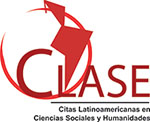Soft skills and global readiness: aligning agronomy education with international certification standards
DOI:
https://doi.org/10.23857/dc.v11i2.4369Palabras clave:
global preparedness, agricultural education, international certification standardsResumen
In the context of competency-based education and international accreditation, the integration of soft skills has become a strategic imperative for higher education institutions seeking to enhance global readiness among graduates. This article explores the role of soft skills in the internationalization of Agronomy education, focusing on how regional universities can align their academic programs with global certification standards such as those set by European. Drawing on institutional analysis and international literature, the study identifies key soft skills—including communication, teamwork, adaptability, leadership, and intercultural competence—as foundational to international engagement and mobility. Despite structural and contextual challenges, the research highlights opportunities to promote soft skills through curricular design, formative assessment, interdisciplinary projects, and virtual internationalization strategies. It also underscores the need to make these competencies visible and measurable within educational outcomes. The findings suggest that soft skills are not only vital for effective participation in global academic and professional environments but also serve as a bridge between local relevance and international excellence. Embedding these competencies into Agronomy programs offers a pathway to comprehensive internationalization and sustainable accreditation success.
Citas
Acker, D. G. (2007). Globalizing agricultural colleges and universities: A guide to strategy and implementation. Association of Public and Land-Grant Universities (APLU).
Beelen, J., & Jones, E. (2015). Redefining internationalization at home. In A. Curaj, L. Matei, R. Pricopie, J. Salmi, & P. Scott (Eds.), The European Higher Education Area (pp. 59–72). Springer. https://doi.org/10.1007/978-3-319-20877-0_5
Bernasconi, A. (2018). Latin American universities and the Bologna Process: From cooperation to convergence? European Journal of Education, 53(4), 552–566. https://doi.org/10.1111/ejed.12311
de Wit, H., Hunter, F., Howard, L., & Egron-Polak, E. (2015). Internationalisation of higher education. European Parliament, Directorate-General for Internal Policies. https://doi.org/10.2861/444393
Egron-Polak, E., & Hudson, R. (2014). Internationalization of higher education: Growing expectations, fundamental values. International Association of Universities.
EURO-ACE. (2021). Competency-Based Standards for International Accreditation in Higher Education. European Association for Accreditation in Competency Education. [Documento institucional].
FAO. (2014). Education for rural transformation: Good practices in the non-formal education sector. Food and Agriculture Organization of the United Nations. https://www.fao.org
Knight, J. (2004). Internationalization remodeled: Definition, approaches, and rationales. Journal of Studies in International Education, 8(1), 5–31. https://doi.org/10.1177/1028315303260832
Knight, J. (2008). Higher education in turmoil: The changing world of internationalization. Sense Publishers.
Merriam, S. B., & Tisdell, E. J. (2016). Qualitative research: A guide to design and implementation (4th ed.). Jossey-Bass.
OECD. (2018). The future of education and skills: Education 2030 – The OECD Learning Compass 2030. OECD Publishing. https://www.oecd.org/education/2030.
Robles, M. M. (2012). Executive perceptions of the top 10 soft skills needed in today’s workplace. Business Communication Quarterly, 75(4), 453–465. https://doi.org/10.1177/1080569912460400
UNESCO. (2013). Global citizenship education: An emerging perspective. United Nations Educational, Scientific and Cultural Organization. https://unesdoc.unesco.org
Yin, R. K. (2014). Case study research: Design and methods (5th ed.). Sage Publications.
Descargas
Publicado
Cómo citar
Número
Sección
Licencia
Derechos de autor 2025 Lucy Marina Pazmiño Calero, Elsa Amalia Basantes Arias, Marienny Barroso Leyva

Esta obra está bajo una licencia internacional Creative Commons Atribución 4.0.
Authors retain copyright and guarantee the Journal the right to be the first publication of the work. These are covered by a Creative Commons (CC BY-NC-ND 4.0) license that allows others to share the work with an acknowledgment of the work authorship and the initial publication in this journal.






